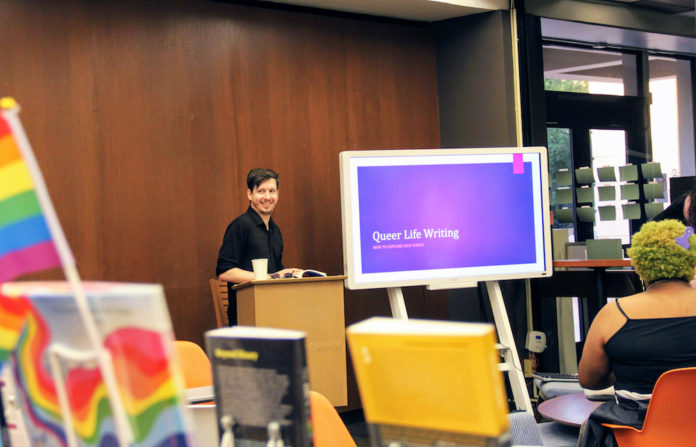
The Intercultural Community Center (ICC), in collaboration with the Mary Norton Clapp Academic Commons and the Sexuality and Gender Alliance (SAGA), hosted two author events, curated a historical display in the Academic Commons lobby and ordered an array of books centered on the LGBTQIAP+ experience in celebration of LGBTQIAP+ history month. The first event was a workshop Oct. 16 with Wendy Ortiz, a psychotherapist and author of three memoirs, focused on self-care for authors writing about traumatic events. The second was a reading by Stephen van Dyck (’06) Oct. 24, who said his memoir “People I’ve Met from the Internet” is informed by his experience as a gay man.
ICC Office Supervisor Micol Garinkol (‘19) said the ICC, SAGA and the Academic Commons developed this month’s programming to draw attention to the opening of the Lavender Lounge, an LGBTQIAP+ space in Pauley Hall that opened Oct. 8. Garinkol and Christopher Arguedas, the ICC’s interim director, said they hope the lounge — as well as the exhibitions and events — will make Occidental’s campus more inclusive for LGBTQIAP+ students.
“There’s an institutional need and students have demonstrated that,” Garinkol said.
Student leadership has been a key part of developing this month’s programming, according to Garinkol. Garinkol said SAGA members helped select articles from the archive to display in the Academic Commons’ lobby. These articles, most of them past issues of The Occidental, highlight the rapid changes in public perception of LGBTQIAP+ students during the past 40 years. A 1980 feature titled “Gay Awareness Week on Campus” questions whether or not Occidental college should have an LGBTQIAP+ visibility week. Several students are interviewed in the article.
Then-sophomore, John Petit, was quoted saying the campus is too conservative to handle the visibility week, and he would not handle it at all. Arguedas said it’s important the ICC acknowledge Occidental’s history.
“It’s the college’s responsibility and the ICC’s responsibility to make a commitment and a re-commitment to students to do better,” Arguedas said. “This month’s programming is part of that commitment.”
Van Dyck read from and led a discussion of his book “People I’ve Met from the Internet” Oct. 24. He read several passages from the book, which lists everyone he has met on the internet, their username and the forum on which he met them. In one paragraph, he described an email exchange with a photographer from The Occidental, who photographed van Dyck and his boyfriend for a cover story about a gay couple sharing a dorm. Students laughed sympathetically when he informed them he and his boyfriend broke up days after the article went to print. Van Dyck said that in the decade since he’s graduated, Occidental has not changed significantly, although he did notice subtle progress.
“There’s much more of an effort to make queer people feel comfortable,” van Dyck said. “[Garinkol] giving her pronouns at the beginning of the event obviously would be unthinkable [in 2008].”
Garinkol and Aguedas said they hope that meeting successful queer creatives like van Dyck will allow LGBTQIAP+ students to see futures for themselves outside Occidental’s walls. Accompanying van Dyck and Ortiz’s talks is a display of books in the Academic Commons lobby, by and for LGBTQIAP+ people. The titles and authors featured showcase the broad range of experiences that exist under the LGBTQIAP+ spectrum, according to Garinkol. Highlighting intersectionality, Garinkol said, is a key goal of the programming for LGBTQIAP+ history month. The displays will remain in the Academic Commons until the spring semester.
Van Dyck said he did not think the book was about his sexual attraction, but his experience as a gay man is a significant part of the narrative.
“It’s just like with any other marginalized group that becomes your identity. Your identity is formed around the ways in which you’ve been excluded, right? So the book is often about the ways in which I and other people in it have been excluded. In that sense it is about gay culture,” van Dyck said.
The mission of these events and exhibitions centered on LGBTQIAP+ experiences is to make historically excluded students feel like they belong on Occidental’s campus, according to Arguedas.
“Belonging is a psychological need for all of us,” Arguedas said. “We want underrepresented students, no matter who they are, to walk into the ICC and feel like they belong there.”
![]()






























